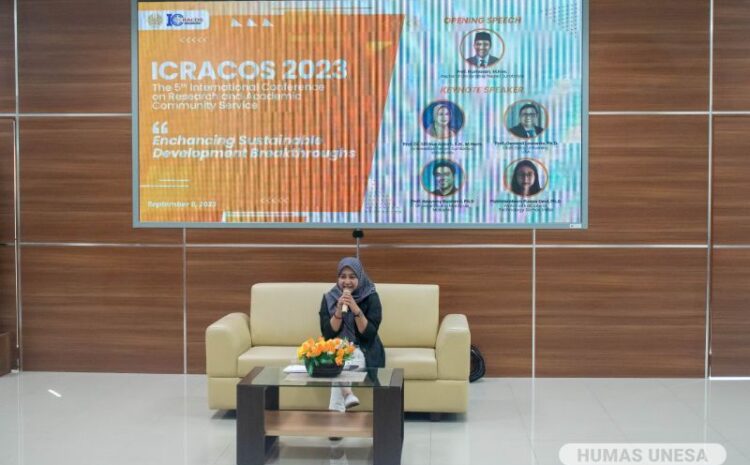ICRACOS 2023 Presents Cross-Border Experts to Discuss Sustainable Development

Unesa.ac.id, SURABAYA—Institute for Research and Community Service (LPPM) Surabaya State University (UNESA) is again holding the 5th International Conference on Research and Academic Community Services (ICRACROS) with the theme “Enhancing Sustainable Development Breakthrough” online on Saturday, September 9, 2023.
This conference was attended by a number of experts from various countries, including, Prof. Oenardi Lawanto, Ph.D. from Utah State University, USA; Prof. Reevany Bustami, Ph.D. from Universiti Sains Malaysia; and Pukhrambam Puspa Devi, Ph.D. from the National Institute of Technology, India.
The event opened with remarks from the Vice Chancellor for Research, Community Service, Innovation, Publications and University Rankings, UNESA, Junaidi Budi Prihanto, S.KM., M.KM., Ph.D.
He said that a commitment to protecting the earth and contributing to human welfare requires various sustainable development platforms, programs and innovations that can be replicated in other places around the world.
“Hopefully this conference can produce a number of joint research and collaborative programs between academics, researchers and practitioners from various universities and countries,” he hoped.
Next, in the material session, Prof. Dr. Siti Nur Azizah, S.H., M.Hum., professor of Halal Business Law, UNESA conveyed about the application of sustainable development principles in the halal industry.
Regarding the challenges, he said that integrating the concept of sustainable construction in halal business is a complex effort involving various issues regarding certification, supply chain management, compliance, consumer awareness and technological advances.
Addressing this problem effectively can facilitate the development of a more resilient and environmentally conscious halal industry, in line with Sustainable Development Goals (SDGs) throughout the world.
Meanwhile, the halal industry is expected to experience significant expansion due to increasing global recognition and consumer demand for halal products.
There is also a conducive atmosphere for the progress of pioneering halal products that have environmentally friendly attributes and sustainable quality and the implementation of sustainable certification standards in the halal industry presents significant and crucial prospects.
In the next session, Prof. Oenardi Lawanto gave material on ‘Emergency Transition to Remote Teaching and Learning (ERTL)’. This was based on the conditions of the Covid-19 pandemic, which occurred suddenly and all students were forced to learn online.
He said, there are internal adjustments that focus on students’ cognitive and affective processes that occur within themselves and are controlled by students as well as external adjustments that focus on cognitive processes that are directly related to the learning environment.
The most effective adaptive strategy for students is through three aspects, namely behavioral, cognitive, and affective by emphasizing executive control processes, focusing on collaboration and guidance in the learning environment, and prioritizing communication facilities, strengthening relationships, and fostering enthusiasm for learning.
On the same occasion, Prof. Reevany Bustami, presented material on ‘Islamic Sustainable Development (I-SD)’. He said that ‘Halalan Toyyiban’ could be raised as an important issue for Islamic Sustainable Development, because it is an integral part of the principles in the Koran related to food products. [*]
***
Reporter: Rafa Afifa Maharani
Editor: @zam Alasiah*
Photo: Public Relations Team Documentation